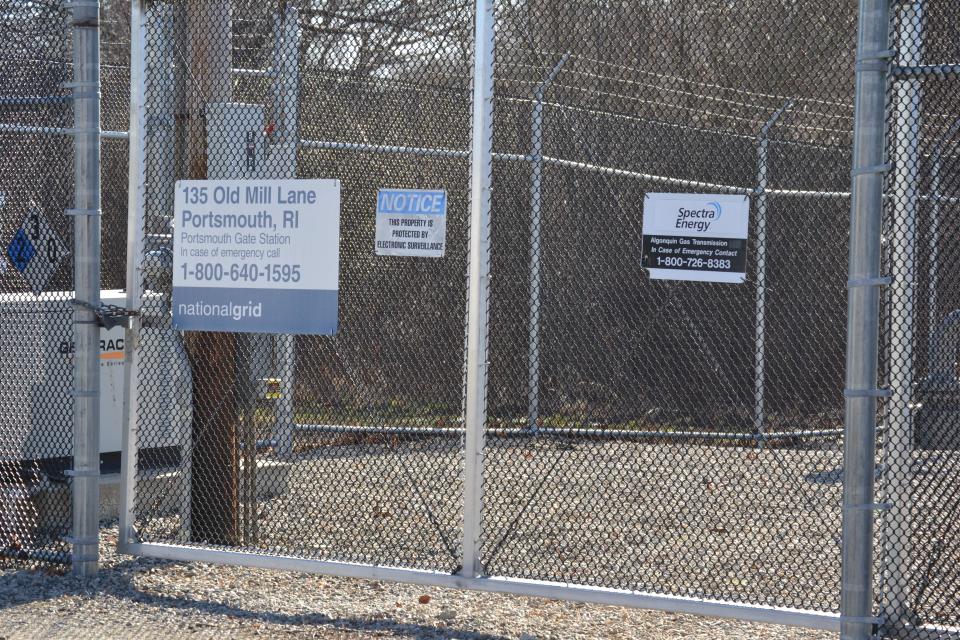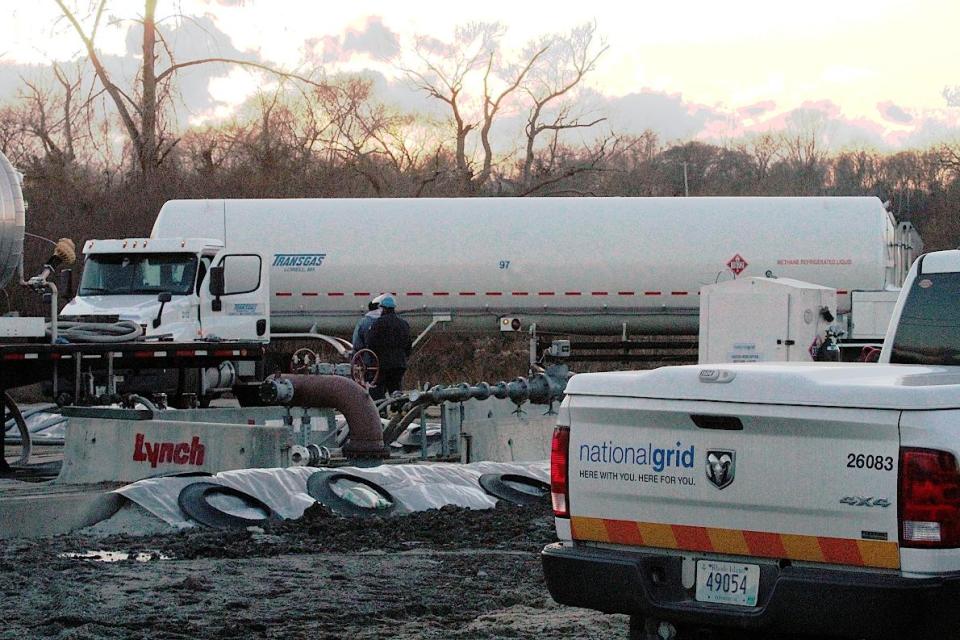Could homeowners around National Grid's Portsmouth LNG site be getting an offer?
National Grid may consider buying homes around the Old Mill Lane Liquefied Natural Gas facility in Portsmouth in response to neighbors’ complaints.
“To potentially mitigate the noise levels, we are exploring the purchase of abutting properties,” said Brian Schuster, National Grid's director for community and customer relations in Rhode Island.
That is what he told the Middletown Town Council Monday night while informing them of a “supplemental application” for the continued operation of the facility that will be submitted to the state Energy Facility Siting Board before April 4, 2022.
National Grid is now seeking what could be called “an interim license to continue operating that facility for an unspecified time after this winter,” Middletown Town Counsel Peter Regan told the council members.

National Grid has storage tanks and LNG tanker trucks at the Old Mill Lane site filled with liquid natural gas and the necessary vaporization equipment there to back up Aquidneck Island's supply of natural gas on very cold days. It is operational from Dec. 1 to March 31.
The facility was set up in the fall of 2019 in response to the gas outage that hit Newport and Middletown in January 2019 and left more than 7,000 customers without heat or the use of other gas appliances like stoves.
Around Old Mill Lane, which is close to the Middletown town line, people are opposed to the facility's location because they are worried about possible safety hazards in connection with LNG and its delivery by heavy tanker trucks. They also do not like the noise of the operation and the lighting.
Newport Gas Outage of 2019: Federal judge allows negligence lawsuits tied to Newport Gas Outage to proceed
As the equipment on the site goes through cycles, it can sound like “a loud truck” when it restarts, Schuster told the council.
Have homeowners been approached?
That National Grid is considering buying nearby homes as a mitigation measure would be a new strategy to deal with the opposition.
“The idea the National Grid is looking at purchasing homes around the facility – it’s something we are exploring, it’s really at its infancy,” said Ted Kresse, the firm’s director of communications, on Tuesday. “We haven’t even begun to do a full analysis of what those properties might cost.”
Previously: State board rules against National Grid on Old Mill Lane LNG facility
Schuster said though he has discussed the facility’s operations with neighbors.
The purchase of homes is just one of several possible mitigation measures that the company is considering to meet the concerns of neighbors closest to the facility, Kresse said.
“We haven’t approached any of the homeowners about even the possibility because we don’t know if that will be necessary, or if it is, who we would entertain that to,” he said. “That would not happen for some time because we do need to go to the Siting Board first. They ultimately have the authority on whether or not they think those measures would be needed or would allow the site to continue to be used.”

The vaporization equipment is near the front of the property on Old Mill Lane, so National Grid is proposing to move the equipment back. That would allow them to build a sound wall and plant vegetation to mitigate the noise, Schuster said.
There are wetland areas at the back of the property, so moving the equipment would require approval from the state Department of Environmental Management, he said.
“That is why it is going to take some time to go through the process,” Schuster said.
Middletown Town Council voices concern
National Grid initially was considering building a new LNG facility on the former Middletown trash transfer station on Navy Land off Burma Road. That would entail installing a new gas transmission line from Old Mill Lane to the site, and would cost more than $100 million, Schuster said.
“To put it over in the tank farm was probably the best place on the island,” Councilman Thomas Welch said. “If it costs you over $100 million to redo the pipe, I don’t really care.”
“Not once have you mentioned the safety of the residents,” Council President Paul Rodrigues told Schuster. “If anything happened there, it would be pretty significant for our residents on the east side. That should be in your sights.”
He said he Googled National Grid and saw it is a $45.5 billion company, according to online sources.
“You or the CEO, John Pettigrew, certainly would not be living next to it,” Rodrigues said. “Those are facts and our responsibility is to look out for our residents. I know it’s in Portsmouth, but it borders Middletown. That is why we oppose it. We really don’t care if it costs you $100 million. If it’s safer, then that’s what you guys should be doing. There is a bottom line for our residents' safety and that’s priceless.”
Previously: National Grid looks to move LNG facility off Old Mill Lane in Portsmouth; Middletown wants say
National Grid has about 13,800 residential and business natural gas customers on Aquidneck Island. All that gas is transported to the island via the Algonquin Gas Transmission line that feeds the Northeast. AGT is owned by Enbridge Gas Inc. of Toronto, Canada.
An Algonquin lateral branches off the AGT mainline in southern Massachusetts and serves southeastern Massachusetts and parts of Rhode Island.
One of the branch lines goes through Tiverton and crosses the Sakonnet River to feed the Portsmouth "take station" at Old Mill Lane, the point where the interstate pipeline connects with the island's gas distribution network. The amount of natural gas transmitted to the island cannot be increased without new pipes.
“You guys have known for a long time that we are at over capacity on this island and you haven’t done anything about it,” said Councilman Dennis Turano. “I don’t get why we now go to the least costly investment for you folks, which isn’t the best option for us.”
“How come you neglected the pipe initially, when you knew you had the problem in the first place?” Turano asked.
Developing Middletown: Middletown Planning Board approves master plan for Rosebrook Commons development
“First of all, the pipe is not ours, so I can’t speak on behalf of Enbridge,” Schuster answered. “The pipe is not under the jurisdiction or ownership of National Grid. We are the distribution company, not the transmission company. That would be a better question for Enbridge.”
“We did explore that option in a long-term capacity study,” Schuster said. “As anybody who has studied installing new transmission lines in the Northeast would know, it is extremely difficult to not only site but get approval for new transmission lines. It’s virtually impossible in the current environment. There are too many stakeholder groups opposing new gas transmission lines in the entire Northeast. That is not just for Rhode Island, but across the board. Once you get to New York, forget it. There have been many attempts, but they have all failed.”
A long-term plan
National Grid has a long-term plan to address natural gas shortages on Aquidneck Island by urging more customers to switch to heat electrification.
The Energy Facility Siting Board asked National Grid to consider a moratorium on new gas hook-ups, something the firm does not advocate because it supports “customer choice,” Schuster said.
Even if a moratorium were enacted in 2023 and the firm could hold gas use levels constant, it would still need to operate Old Mill Lane during the winters until 2030, he said.
“That’s if we have unprecedented degrees of heat electrification, demand-side management, and efficiency programs,” Schuster explained.
Demand-side management means curtailing natural gas use when low temperature thresholds are reached. Some customers would be asked to turn down their thermostats. In some cases, customers would have to shut down and turn to an alternate heating source, he said.
This article originally appeared on Newport Daily News: National Grid Portsmouth LNG site continued use sought

